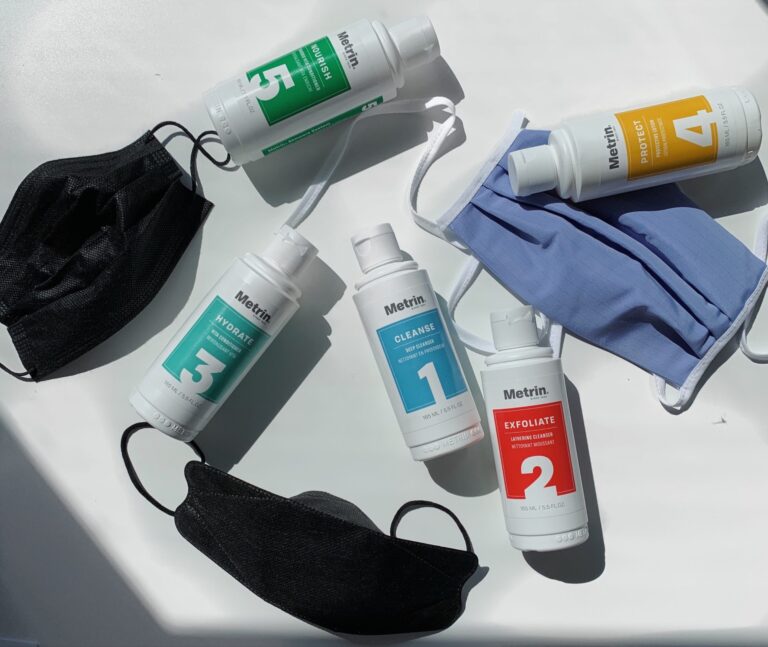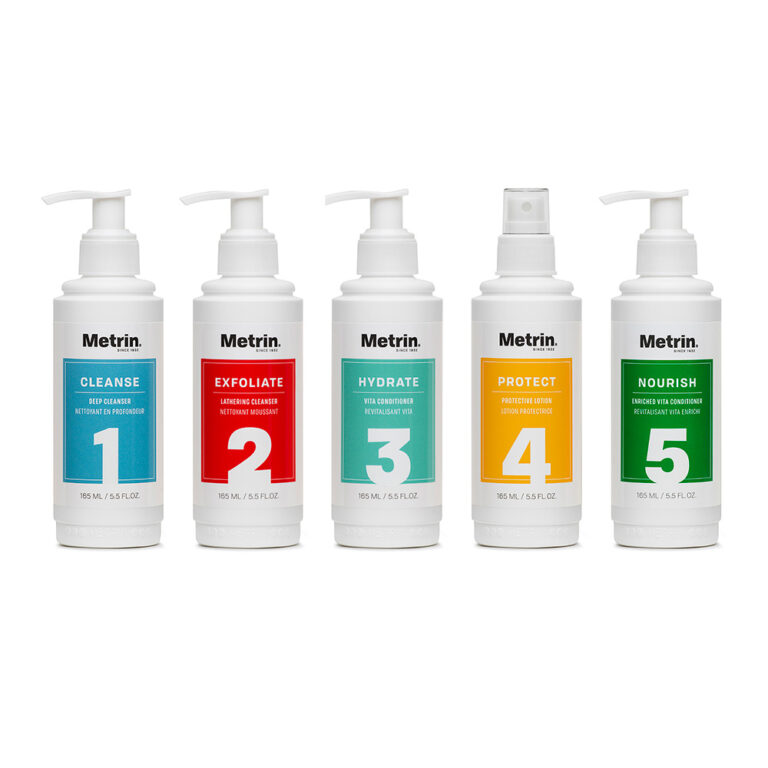Why Your Skin Needs More Exfoliation
Exfoliation is important. It’s the key to healthy skin. Your skin does this naturally every day as a part of its normal renewal process. Helping your skin exfoliate with a daily skin cleansing process further aids it to remove any lingering dead skin cells to help your skin be at its best.
But how often is enough? Well, it depends. The overall benefits show the more exfoliation, generally the better (but don’t overdo it!). Many try to eek out it a few times a week for those with normal or combination skin and less frequently for people with sensitive skin.
Many dermatologists recommend daily exfoliation (twice every day!) as be a key part of your regular daily skin care routine. Daily gentle exfoliation should be an essential part of your skin’s regular cleansing process. Like we said, the more regular exfoliation generally the better. However, for those with sensitive skin types or those who haven’t exfoliated properly for some time might only be able to handle exfoliation once or twice a week initially, but gentle exfoliation can be gradually increased to a daily frequency. How your skin responds also depends on your skin’s condition.
If your skin is oily or you exercise often, daily gentle exfoliation will also help remove any oils that could be trapped with any lingering dead skin cells. If you have mature, flaking, or dull skin, (often times caused by a buildup of dead skin layers caused by lowered hormones from menopause), or have been under stress, adding an exfoliation boost a few times per week to the daily exfoliation routine with a chemical exfoliant such as glycolic acid may be necessary and quite helpful. As with anything related to you body, the best way to is to introduce daily exfoliation or to add the exfoliation boost is to do so gently and gradually to work with your skin’s natural functions.
Start Exfoliating
First of all, if you aren’t exfoliating already or doing it infrequently, you should definitely start. Infrequent or irregular exfoliation, especially if its not gentle enough for your skin, is difficult for your skin as it has to work harder to adjust. Doctors and experts agree about the benefits of exfoliation for everyone to get rid of dead skin cells hanging around and it also eliminates excess dirt missed by typical skin cleansers. This process makes room for fresh cells to flourish.
Benefits
The benefits of regular exfoliation are endless. With regular exfoliation comes great skin – its barrier functions are better, reduces bacteria buildup and breakouts, and the skin will look better, too. It removes dead skin as mentioned, but also reduces skin discoloration and pigmentation, fine lines, and wrinkles. In addition, exfoliating helps your skin absorb moisturizer and any other skin care products you use more efficiently. This is particularly important during colder weather.
One of the chief benefits of exfoliation is it decreases breakouts. During exfoliation, superficial skin cells send signals to the layers of cells below to increase new cell production. This speeds up cell renewal and returns radiant skin to its youthful glow.
Be Gentle
It’s important to remember to act gently as possible during exfoliation. The concept of exfoliation should be about softening the dead skin cells for ease of removal. While you’re at it, the exfoliation process – if done right with the right products and tools – will remove oil, surface level dirt, and any leftover residual makeup. These are other reasons why the double cleanse method can be a smart and effective part of your skin regimen.
Gentler exfoliation twice a day in smaller increments is easier on the skin. Like anything, doing it regularly and more often makes the entire process better and smoother. It’s the same thing as cleaning anything – a little bit every day instead of only when it’s become a big mess. It’s just smarter and healthier.
Aging
Your skin does exfoliates naturally. When we’re young, our skin exfoliates rapidly and naturally renews itself about every 25 days or so. Dead skin cells are naturally and steadily sloughed off. But as we age, the natural exfoliation process becomes more and more sluggish, typically slowing by about 10% per decade. By the age of 30, the process begins to slow down which can mean more pigmentation and duller complexion.
Without a little exfoliation boost, skin turns ashen, dull, and sallow – and we say goodbye to our skin’s fabulous translucent, radiant, youthful glow due to the accumulation of dead skin cells on the surface.

Regeneration
Exfoliation stimulates cell turnover where old dead cells get replaced by healthy, new ones. It also enhances collagen production which improves the skin’s texture and thickness by providing underlying support.
It’s kind of like hitting the gym: to get stronger, you have to work your muscles harder. Daily exfoliation also makes nourishment and protection more powerful. It’s easier for your skin to naturally regenerate if dead skin cells are unable to accumulate and get in the way of your skin’s renewal.
Thicker Skin
It may encourage your skin’s collagen production and can improve skin thickness – which ultimately reduces (and sometimes, even reverses) the appearance of fine lines and wrinkles. Thicker skin means fewer wrinkles. This is best is achieved through exfoliation.
If you have a thick layer of dead skin cells on top of your skin, it will make it difficult for those precious collagen-building nutrients in your skin care products to actually reach your skin. Those nutrients will not deeply enough or in the concentrations needed to fuel your skin’s inner layers. Exfoliation helps ensure these key ingredients reach their destination (where they can actually start working).
Dry Skin
One of the most common reasons people suffer from dry skin is due to having a thick layer of dead skin cells preventing any moisture from getting in. Does your skin always feel dry? Do a full 180° shift in your thinking and start exfoliating. Moisturizing without removing dead skin cells is like taking a shower while fully clothed. It’s not particularly effective and a waste of your time.
Clear Skin
Exfoliation should be your final skin-cleansing step. It’s how you clear away all that accumulated junk – products, skin cells, and dirt – that clog up your pores. This allows fresh new skin cells to shine at the surface. While you can over-exfoliate, the more you do it, generally the better (use your common sense). Twice daily is ideal, but more than that may not be beneficial.
Exfoliation is the cornerstone of any smart Skincare System. Proper exfoliation is crucial to maintaining healthy, young-looking skin. It’s hard to overdo and without it, your skincare routine becomes far less effective, and you do not need harsh chemicals or abrasives to encourage your skin’s natural renewal processes. Without proper exfoliation, it’s pretty much all for naught.
Hard Truth
While important, exfoliation alone is not nearly enough to achieve or maintain youthful, radiant skin. It is, however, a good start – it needs to work harmoniously with cleansing, nourishing and protecting skin care steps. A regular skin care routine working to nourish every layer of your skin does not have to be complicated or expensive. In fact, doing the same thing every day to make sure your skin proper and naturally cycles through its own rhythms is likely what you need.
Everyone ages, of course. It’s a natural process. However, we want to stay, look, and feel as healthy and young as possible. We are all exposed to the elements of nature and it’s unrealistic to think otherwise. Our ideal youthful glow is unlikely to return. That said, exfoliation can do a lot to slowing down or taking a few years off the look of your age and of course, to keep your skin functioning at its best as long as possible.
To fully benefit from exfoliation, you should nourish your skin’s deepest layers and protect it to seal in the nutrients while they do their jobs. While surface exfoliation should be the last step in your skin cleansing routine, it’s also the solid foundation of any healthy skin care regimen.







